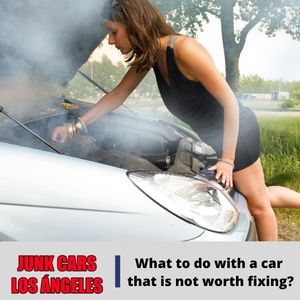You may not be in a position to fix your car. You may have put off maintenance for too long or had some other difficulty with the vehicle.
This is when it’s time to decide what to do with that car.
How to determine if a car is worth fixing? There are many factors to consider, such as the age and condition of the car, the cost of the repairs, and your budget.
If the car is not worth fixing, there are several other options you can explore, such as selling it for parts or donating it to a charity.
If you want to sell it and get the money, but you’re not sure how to do it, then this article is for you.
We’ll give you all of the information that you need on what to do with a car that’s not worth fixing.
What is the cost of repairing a car?
When a car needs repairs, the cost of the repairs can be expensive. There are a few factors that will affect the cost of the repairs, such as the make and model of the car, the extent of the damage, and the type of parts that need to be replaced.
model of the car, the extent of the damage, and the type of parts that need to be replaced.
There are also a few factors to consider.
Firstly, the extent of the damage will play a role in how much the repairs will cost. Additionally, the type of repair that is required will affect the total bill.
Sometimes, the parts needed for the repair may not be readily available, which can cause the cost of the repair to skyrocket. This is especially true if you need a part that is specific to your car model or makes.
In these cases, you may have no choice but to get rid of your car and buy a new one.
The cost can vary widely depending on the damage. Sometimes the repairs may be relatively minor and affordable, while other times they can be much more costly.
To determine if a car is worth repairing, you need to take into account both the cost of the repairs and your budget.
Is it worth it to keep fixing an old car?
Is your car worth repairing? This is a question that you may need to answer.
There are a few things that are not worth repairing when it comes to your car.
The make and model of the car, the extent of the damage, and the type of parts that need to be replaced are all important factors to consider when deciding if a car is worth repairing.
If the damage is too extensive, it may not be worth fixing. Additionally, if the cost of the repairs is more than the value of the car, it’s usually not worth fixing.
Another reason to not repair your car is if the required repairs are major.
The age and condition of the car, the cost of repairs, and your budget are all important factors to take into account.
Also, if the repairs require a lot of time and effort, it’s probably not worth it.
In these cases, it’s often better to just say goodbye and get rid of your car.
What is the hardest thing to repair in a car?
When it comes to repairing a car, there are a few things that are more difficult than others. The most difficult repairs tend to be the ones that affect the engine or the transmission.
These repairs can be expensive and time-consuming, which is why it’s important to consider whether or not a car is worth repairing in the first place.
If these components are not working properly, the car may not be able to run at all.
Here we mention the most expensive repairs:
-
Engine repair.
People who have gone through the misery of changing an engine, a trained auto repair will tell you that it is the most difficult task in any automobile.
Cars are expensive, and you may replace the engine rather than purchase a new car.
Depending on how many miles your previous engine has gathered, you may need to replace some of the connecting parts that have also accumulated mileage, such as the transmission.
-
Transmission.
Transmission repairs are notoriously expensive, therefore mechanics may discover that some clients are hesitant to handle these issues until they reach crisis proportions.
Problems with gear shifts might occur manually due to low transmission fluids or poorly adjusted shift cables or clutch connections.
Overheating fluid, sliding gears, and the dreaded dragging clutch all necessitate professional intervention.
-
Clutch.
The clutch, being a “wear and tear” item of a car, may need to be replaced as frequently as every 30,000 kilometers, depending on how you drive.
The less prevalent reason for clutch repair is incorrect fitment, which causes oil leakage.
Repairing the clutch requires dismantling the transmission, which is why it is so difficult to repair.
-
Air conditioner repair or recharge.
Working with the A/C system still necessitates very specific high pressures and a plethora of tubing and odd components (some of which are hopelessly buried in a dash or linked to a computer) as well as other tangential issues related to the first law of thermodynamics.
If you have to go search up the first thermodynamics law, you probably don’t belong there.
Another thing that can be difficult to repair is the body of the car. If there is damage to the body, it can be expensive to fix.
Additionally, it may be difficult to find a body shop that is willing to do the work.
At what mileage do cars start to have problems?
This is a question that many people ask when they are considering whether or not to repair their car. There are a lot of factors that go into determining whether a car is worth repairing or not.
One of the most important factors is the mileage of the car. Typically, cars start having problems around 100,000 miles.
However, this varies depending on the make and model of the car.
This is because the wear and tear on the car starts to take its toll at that point.
Furthermore, in most cases, they no longer have a valid manufacturer’s guarantee, which means you must pay for repairs out of pocket if something goes wrong.
What if the damage is more than the car is worth?
If the damage to your car is more than it’s worth, you may have to consider getting rid of it.
There are several other options you can explore:
-
Sell your car parts.
One option is to sell the car parts. This can be a good option if the car is still in relatively good condition and there are still some valuable parts that can be sold.
You can sell a lot of auto components if they are clean, still operate well, and are priced reasonably.
Even if you may offer a lot of auto components, it’s still crucial to choose the ones you know will sell.
However, the amount of time and labor required to “pick up” used parts from an old vehicle and sell them individually can be a challenge.
Scrapping an automobile is a full-time job in itself. If you are thinking about doing it, keep in mind that the procedure is lengthy and time-consuming.
Before you start dismantling your vehicle, you should understand what the separation involves and how long it will take.
-
Donate it to charity.
When you sell a car for parts, you will usually donate your car to charity. This is a great way to get rid of a car that’s not worth fixing and help a good cause at the same time.
Additionally, you may be able to get a tax deduction for your donation.
When you donate a car to charity, there are a few things that you need to do to make the process go smoothly.
The first thing is to find a reputable charity that will accept your car. There are a lot of charities that accept car donations, so you should be able to find one that’s right for you.
However, not all charities will accept car donations. You will need to do some research to find a charity that is willing to accept your car.
-
Sell your car to a junkyard.
If your car is damaged and the cost of repairs is more than the value of the car, it may be time to say goodbye and sell your car to a salvage yard.
By selling your car to a junkyard, you will get cash for your car no matter what condition it is in. This is a better option than keeping your car in its current condition.
You will get cash quickly and safely for a car that is not worth repairing.
If you need to sell a car to a junkyard, you’ll want to receive as much money as possible for the damaged vehicle.
There are a few things you can do to optimize the amount you receive when selling a car that has been damaged in a crash or one that has just worn out.
If your automobile is a popular model, you might be able to sell it to a junkyard in exchange for a used car.
In addition to the cash, you may be entitled to a junkyard tax deduction if you can demonstrate that you sold the car at a significant loss.
How do you sell your car for cash to a junkyard?
Regardless of how your automobile got to this point, selling it to a junkyard may be a stressful situation if you are not fully educated, especially if you are a first-time seller.
Here’s a guide to guiding you through the process of selling your automobile to a junkyard.
-
Step 1: Get in touch with junkyards in your neighborhood.
In your local Yellow Pages, look for junkyards. Find all of the local junkyards that are in your area or close enough.
Inform each junkyard that you have a vehicle that you want to sell. Give them all of the car’s details, such as the make and model, as well as the sort of damage the vehicle has.
The junkyard employee may ask you several questions regarding the car.
To receive the most accurate offer for your car, you should strive to answer all of the questions as truthfully and accurately as possible.
-
Step 2: Receive selling offers and compare them.
If the junkyards are interested in your vehicle, they will most likely make you an offer over the phone.
Avoid doing business with junkyards that need you to bring your vehicle in for an estimate. This may merely increase the costs of selling the automobile.
Wait until you’ve received numerous offers before selecting where to sell your automobile.
Determine which offer is the best, and once you’ve selected, phone the junkyard and let them know you’re ready to close the deal. Once both have agreed, the junkyard will set a pickup time.
-
Step 3: Prepare the car, removing all your personal things.
Remove any personal things from the automobile in preparation for collection.
This is not the same as a private or dealership sale, where the new owner will search for and (ideally) return anything they discover. Whatever is left within will be lost forever.
Remove GPS devices and backup cameras with extreme caution.
It’s easy to lose sight of this in the midst of the stress of selling your automobile.
-
Step 4: Accept the deal.
When your car gets to the junkyard, it is usually examined. If the junkyard is hauling it, they will usually check the automobile on-site before towing it.
As long as there are no last-minute complications, the junkyard will pay you and you and the technician will sign the title. The seller will then hand over the title to the junkyard.
-
Step 5: Give the car.
Allow the junkyard employees to check your car. If the car is as stated, the junkyard should pay you the price they quoted you over the phone.
If you omitted anything when on the phone, now is the moment to bring it up and try to negotiate a better selling price. Sign over the title and accept cash as payment.
Can you sell my car to a junkyard without the title?
When you sell a car for parts, you will usually need to have the title to the car. This is because the junkyard will need to be able to transfer the title to a new owner.
However, there are a few ways that you can sell a car without the title.
Several junkyards are prepared to pay cash for junk cars that do not have a legitimate title and that no one else is willing to buy as long as the owner provides a copy of the car’s registration, a driver’s license, or any other document as evidence of ownership as a guarantee.
If they acquire an automobile without a title, the junkyard will typically buy it as scrap.
They won’t be able to retitle or resell it, so you won’t be able to collect as much money for it as you would if you had the title.
Junkyards that acquire automobiles without titles will demand further proof of ownership to avoid future headaches.They’ll want to examine your automobile registration as well as your identity. They may request more documents.
How much do junkyards pay for cars that don’t run?
This is a difficult question to answer, as it can vary depending on the junkyard. The amount that a junkyard will pay for a car that doesn’t run will vary depending on the make and model of the car.
However, most junkyards will offer a few hundred dollars for a car that doesn’t run.
If your car is no longer in working condition, or if there are no valuable parts that can be sold, a junkyard may be your best option.
Junkyards will usually pay anywhere from $50 to $200 for cars that don’t run.
The price may vary depending on the age and condition of the car.
Cash for your useless car with Junk Cars Los Angeles!
Car owners who want to sell their automobiles are urged to look into other possibilities before selling their vehicles to a junkyard.
To be honest, selling your automobile in this manner should only be considered a last resort.
Dealing with a junkyard is unquestionably the least enjoyable and least profitable way to sell an automobile, and it should be saved for vehicles with little to no hope.
Selling to a junkyard may be a reasonable alternative for sellers who are just trying to get rid of an old beater or dump a car that no longer operates and is just taking up space.
If selling your car is the route you wish to pursue, contact Junk Cars Los Angeles. We will offer you a fair market value for your junk or damaged vehicle.
Our experienced staff of purchasers has extensive knowledge in the vehicle industry, making it simple to sell your junk car for the highest possible money.
If you accept the offer, we will deposit the money straight into your bank account and tow the automobile for free within 24 to 48 hours!
Don’t wait any longer and call us at 323-205-7761

